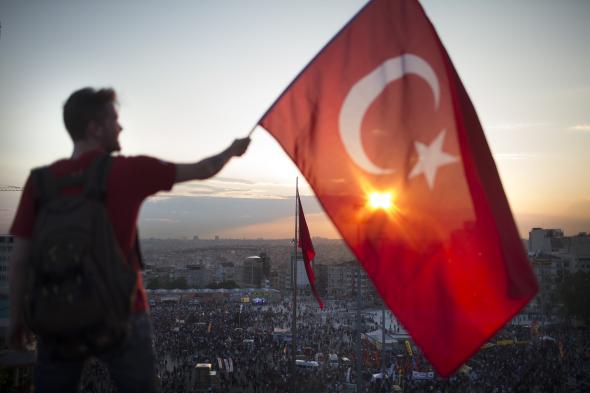With Turkey entering a period of political uncertainty after Sunday’s stunning political setback for the ruling A.K. Party, Turkish Internet users are amusedly passing around a clock showing how long it’s been since President Recep Tayyip Erdogan appeared on TV. Turkish broadcasters had carried Erdogan’s broadcasts as often as three times a day during the last few weeks of the campaign, so his silence—with the exception of a brief written statement on the results of the election—has been conspicuous. As of Tuesday, he’s been out of sight for more than two days.
Turkish voters may have fended off an Erdogan dictatorship on Sunday, but now Turkey has a different problem: It’s not really clear if anyone can build up enough support to govern the country.
The AKP needs at least one coalition partner to form a government, but doesn’t have any natural allies in the three other parties elected to the parliament over the weekend. If the AKP can’t form a government in 45 days, new elections will have to be held. The most likely junior partner is thought to be the ultranationalist MHP, though for the time being the party’s leaders are being coy. Given that the big story of the election was the triumph of the Kurdish-backed HDP, which entered parliament for the first time by appealing to non-Kurdish secularists and leftists, it would be ironic if the end result of the vote was to bring the MHP into power.
While the party has moderated the pseudo-fascist and Turkish-supremacist views that once defined it, the MHP is still hostile toward minority-rights movements and has opposed Erdogan’s efforts to reach a peace deal with the PKK, the Kurdish militant movement that has fought the government for decades. The MHP’s leader slammed Erdogan on the campaign trail after the president said he would like to learn the “beautiful Kurdish” language, saying he had “degraded himself.” The MHP also attacked him for (belatedly) supporting the Kurdish fighters battling ISIS in the Syrian border city of Kobani last year. Sunday may have been the most impressive Kurdish political victory in decades, but if Erdogan has to deal with the MHP, it will likely make concessions to Kurdish political autonomy much less likely.
But of course, we won’t really know what’s in store until the president decides to emerge from isolation and make his intentions clear. He’s on the clock.
